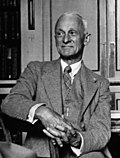Harvey Cushing
Harvey Cushing (April 8, 1869 – October 7, 1939) was an American neurosurgeon, pathologist, writer and draftsman. He is considered the father of modern neurosurgery.
Early Life and Education[edit]
Cushing was born in Cleveland, Ohio. He was the youngest of ten children. His parents were Henry Kirke Cushing, a physician, and Betsey Maria Williams. He graduated from the Yale University in 1891. He completed his medical degree at Harvard Medical School in 1895.
Career[edit]
Cushing began his career at the Johns Hopkins Hospital where he worked under the guidance of William Stewart Halsted, the father of modern surgery. He developed many of the basic surgical techniques for operating on the brain. This dramatically reduced the high mortality rates that were associated with brain surgery at the time.
In 1913, Cushing became the surgeon-in-chief at the newly built Peter Bent Brigham Hospital in Boston. He also became the professor of surgery at the Harvard Medical School. He held these positions until he retired in 1932.
Contributions to Medicine[edit]
Cushing made significant contributions to the field of medicine. He is best known for his discovery of Cushing's disease, a condition caused by a tumor of the pituitary gland which leads to overproduction of cortisol by the adrenal glands.
He also made significant contributions to brain surgery, including the use of radiography in surgical operations. He was the first to use x-rays to locate brain tumors. He also developed the method of operating with the patient sitting up, a method still used today in certain types of brain surgery.
Awards and Honors[edit]
Cushing received numerous awards and honors for his work. In 1914, he was awarded the Cameron Prize for Therapeutics of the University of Edinburgh. In 1926, he was awarded the Lannelongue Medal by the Paris Surgical Society. In 1930, he was awarded the Gairdner Foundation International Award.
Death and Legacy[edit]
Cushing died in 1939 at the age of 70. His contributions to medicine, particularly to the field of neurosurgery, continue to be recognized today. The Cushing Brain Tumor Registry, containing over 2,000 case studies of patients he treated, is housed at the Yale University School of Medicine.
See Also[edit]
References[edit]
<references />
Ad. Transform your life with W8MD's Budget GLP-1 injections from $75


W8MD offers a medical weight loss program to lose weight in Philadelphia. Our physician-supervised medical weight loss provides:
- Weight loss injections in NYC (generic and brand names):
- Zepbound / Mounjaro, Wegovy / Ozempic, Saxenda
- Most insurances accepted or discounted self-pay rates. We will obtain insurance prior authorizations if needed.
- Generic GLP1 weight loss injections from $75 for the starting dose.
- Also offer prescription weight loss medications including Phentermine, Qsymia, Diethylpropion, Contrave etc.
NYC weight loss doctor appointmentsNYC weight loss doctor appointments
Start your NYC weight loss journey today at our NYC medical weight loss and Philadelphia medical weight loss clinics.
- Call 718-946-5500 to lose weight in NYC or for medical weight loss in Philadelphia 215-676-2334.
- Tags:NYC medical weight loss, Philadelphia lose weight Zepbound NYC, Budget GLP1 weight loss injections, Wegovy Philadelphia, Wegovy NYC, Philadelphia medical weight loss, Brookly weight loss and Wegovy NYC
|
WikiMD's Wellness Encyclopedia |
| Let Food Be Thy Medicine Medicine Thy Food - Hippocrates |
Medical Disclaimer: WikiMD is not a substitute for professional medical advice. The information on WikiMD is provided as an information resource only, may be incorrect, outdated or misleading, and is not to be used or relied on for any diagnostic or treatment purposes. Please consult your health care provider before making any healthcare decisions or for guidance about a specific medical condition. WikiMD expressly disclaims responsibility, and shall have no liability, for any damages, loss, injury, or liability whatsoever suffered as a result of your reliance on the information contained in this site. By visiting this site you agree to the foregoing terms and conditions, which may from time to time be changed or supplemented by WikiMD. If you do not agree to the foregoing terms and conditions, you should not enter or use this site. See full disclaimer.
Credits:Most images are courtesy of Wikimedia commons, and templates, categories Wikipedia, licensed under CC BY SA or similar.
Translate this page: - East Asian
中文,
日本,
한국어,
South Asian
हिन्दी,
தமிழ்,
తెలుగు,
Urdu,
ಕನ್ನಡ,
Southeast Asian
Indonesian,
Vietnamese,
Thai,
မြန်မာဘာသာ,
বাংলা
European
español,
Deutsch,
français,
Greek,
português do Brasil,
polski,
română,
русский,
Nederlands,
norsk,
svenska,
suomi,
Italian
Middle Eastern & African
عربى,
Turkish,
Persian,
Hebrew,
Afrikaans,
isiZulu,
Kiswahili,
Other
Bulgarian,
Hungarian,
Czech,
Swedish,
മലയാളം,
मराठी,
ਪੰਜਾਬੀ,
ગુજરાતી,
Portuguese,
Ukrainian




